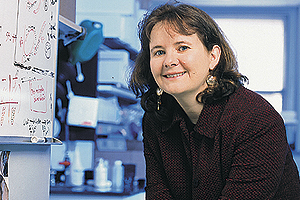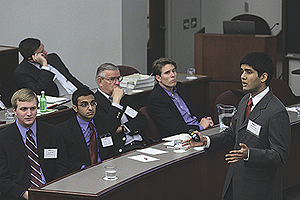Chicago In the News
The Chronicle’s biweekly column Chicago In the News offers a digest of commentary and quotations by a few of the University faculty members, students and alumni who have been headlining the news in recent weeks. Chicago faculty members are some of the most frequently quoted experts, so space allows publishing references to only selected examples.
To read many of the full newspaper articles mentioned in this column, visit the In the News column at the University News Office Web site: http://www-news.uchicago.edu/.
Transforming students' lives
A $100 million gift given by an anonymous donor to the University—to fund student aid through a newly created scholarship program and to launch an effort to raise an additional $300 million to endow the program indefinitely—was the subject of numerous newspaper articles and broadcast reports, including stories carried by the Chicago Sun-Times, the Chicago Tribune, the Los Angeles Times, The New York Times and the International Herald Tribune. The Thursday, May 31 Chicago Tribune story quoted President Zimmer, who spoke about the donor, a Chicago alumnus who has chosen anonymity. “Our donor is somebody who himself felt that his life had been transformed by the nature of the education that he had. He wanted to make the gift to ensure that students had the opportunity independent of their financial capacity.” Michael Behnke, Vice President and Dean of College Enrollment, said: “A quarter of our students will have a very different experience than they had before. They will be free from this worry about debt. It will transform student life on campus.”
Gene-stacking on market
 Daphne Preuss | |
Daphne Preuss, the Albert D. Lasker Professor in Molecular Genetics & Cell Biology, was quoted in a Wednesday, May 23 Chicago Tribune story about her company Chromatin's new research partnership with Monsanto Co. Preuss, who is currently on leave from the University, is marketing the gene-stacking technology she developed and which could be used “to make plants more attractive sources for ethanol, or tailor strains of corn and other food crops grown in developing countries to adapt to harsh local conditions,” the article noted. “We’ve done a lot of work in greenhouses with corn,” said Preuss. “Now Monsanto can apply this technology to its favorite plant varieties, doing research in greenhouses and in the field under real-world conditions,” she added. The article also quoted Alan Thomas, Director of UChicago Tech, Office of Technology and Intellectual Property. “This is a significant milestone for a technology that has come a long way since its development at the University. We hope this is the first of many such announcements,” said Thomas.
'Pandemic in the making'
Robert Daum, Professor and Section Chief of Infectious Diseases in Pediatrics, was quoted in a Tuesday, May 29 Chicago Tribune article that reported on a serious illness called MRSA, which stands for methicillin-resistant staphylococcus aureus and is a potentially virulent bacteria that is becoming a public health challenge. Being spread mainly through contact between people in public housing, Cook County Jail and public health facilities, such as Stroger Hospital, MRSA is being contracted by more individuals than in past years. “This is a pandemic in the making and the source of an enormous increased burden of disease across Chicago,” said Daum. He also noted in the interview that about 96 percent of skin and soft tissue infections currently identified in jail inmates are caused by community-associated MRSA.
A call to stop the violence
Dexter Voisin, Associate Professor in the School of Social Service Administration, wrote a commentary that appeared in the Tuesday, May 29 Chicago Sun-Times. Pointing to a recent gang-related shooting on a CTA bus, which took the life of 16-year-old Blair Holt, who was not involved in gang activity, Voisin called for community and government response to the violence by cleaning up decay and crime in low-income neighborhoods. Voisin wrote that many Chicago teenagers struggle daily with random violence in the neighborhoods where they live and go to school. “Exposure to violence is linked to psychological distress, which in turn is linked to low school achievement. After all, how can a teenager concentrate in school when he is surrounded by the prospects of random violence on his way to, in and from school? What does living constantly on high alert do to one’s psyche?”
Immigrants as scapegoats
Susan Gzesh, Director of the Human Rights Program, was interviewed for an article published in the Tuesday, May 29 Chicago Tribune. The article reported on an influx of Latino immigrants in some suburbs of Chicago that has increased tension among longtime residents and the new immigrants, with some suburban governing boards proposing ordinances to make English the official language in their towns. Said Gzesh, “The country is in a great deal of turmoil right now. People in the suburbs are feeling uncomfortable and that breeds insecurity. There is a tendency to look for scapegoats during times like this.” Gzesh and others believe the challenge will be for community leaders to promote and maintain harmony between longtime residents and their new neighbors whose primary language is Spanish.
Health of a nation
Leon Kass, the Addie Clark Harding Professor in Social Thought and the College, wrote an essay titled “Science, Religion and the Human Future” that appeared in the April issue of Commentary magazine. Kass, who served on the President’s Council on Bioethics, wrote about the intensifying debate between science and scriptural religion, noting that the stakes are high in this contest. “At issue,” wrote Kass, “are the moral and spiritual health of our nation, the continued vitality of science, and our own human self-understanding as human beings and as children of the West.”
Customizing test preparation
 Karan Goel describes his business plan for PrepMe.com at the Graduate School of Business | |
Alumnus Karan Goel (A.B.,’04, M.B.A., ’06) was featured in a Tuesday, May 22 Chicago Tribune story about his business Internet venture, PrepMe.com, which he started with two other associates after winning two business-plan competitions, one at the Graduate School of Business and another with Fortune magazine. PrepMe offers college entrance exam preparation for the ACT and SAT by providing course work and/or tutoring to help raise high school students’ test scores. “Teenagers use the Internet for everything,” said Goel. “What that means is they are very comfortable using online programs. The idea is you make it customized and compelling.”
The Barenboim factor
The Sunday, May 27 Chicago Sun-Times published a feature story on Cliff Colnot, Conductor of Contempo, the Department of Music’s contemporary chamber players. The story focused on Colnot’s diverse music career, including his work with former CSO conductor Daniel Barenboim, who Colnot met through his former wife, Shulamit Ran, the Andrew MacLeish Distinguished Service Professor in Music and the College, and the commercial work he did. “In commercial and pop work, we were concerned with delivering a melody and a hook. In contemporary music, so much emphasis was on technical and rhythmic questions. But when I started working with Barenboim, things just shifted into a much wider arena.”
Common and painful
Frederic Coe, Professor in Medicine and Director of the Kidney Stone Program at the University Medical Center, was interviewed as the expert source for a Sunday, May 27 Chicago Tribune story that explained and described the medical condition of kidney stones. Coe noted they are very common and very painful. “The pain usually begins rather suddenly. Women say they’d far rather be in labor without anesthesia. I’ve had poets as patients and asked them to use their artistic ability to describe it. They say it’s internal, like fire or boring, burning hot, like a bore is being drilled.”
![[Chronicle]](/images/sidebar_header_oct06.gif)